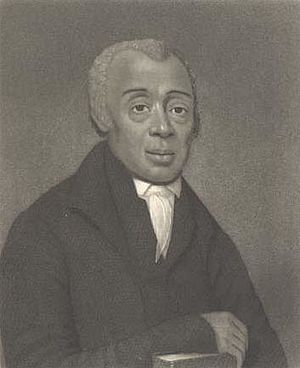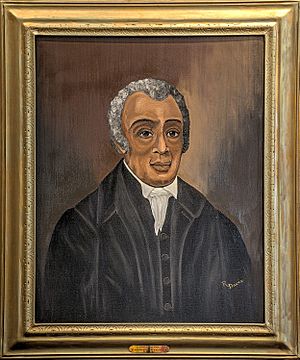Richard Allen (bishop) facts for kids
Quick facts for kids The Right Reverend Richard Allen |
|
|---|---|
 |
|
| Church | African Methodist Episcopal Church |
| Enthroned | April 10, 1816 |
| Reign ended | March 26, 1831 |
| Predecessor | Formed denomination |
| Successor | Morris Brown |
| Orders | |
| Ordination | 1799 |
| Personal details | |
| Born | February 14, 1760 Delaware Colony |
| Died | March 26, 1831 (aged 71) Philadelphia, Pennsylvania |
| Buried | Mother Bethel AME Church, Philadelphia, Pennsylvania, United States |
| Denomination | African Methodist Episcopal Church |
| Spouse | Flora, Sarah Bass |
| Children | Richard Jr., James, John, Peter, Sara, and Ann |
| Occupation | Founder of the African Methodist Episcopal church, minister, abolitionist, educator, writer, and one of America's most active and influential black leaders |
Richard Allen (born February 14, 1760 – died March 26, 1831) was an important leader for Black people in America. He was a minister, a teacher, and a writer. In 1794, he started the African Methodist Episcopal Church (AME). This was the first church in the United States created by and for Black people. He opened his first AME church in Philadelphia.
In 1816, Allen was chosen as the first bishop of the AME Church. He wanted to create a church where free Black people could worship without unfair treatment. He also wanted enslaved people to find respect and hope. Allen worked to improve the lives of Black people. He started schools to teach reading and writing. He also helped create groups to plan for political change.
Contents
Early Life and Gaining Freedom
Richard Allen was born into slavery on February 14, 1760, in Delaware Colony. When he was a child, his family was sold to Stokley Sturgis. Sturgis had a large farm. Because of money problems, Sturgis sold Allen's mother and two of his siblings.
Richard, his older brother, and sister stayed together. They started going to meetings of the local Methodist Society. This group welcomed both enslaved and free Black people. Their enslaver, Sturgis, even encouraged them to go. Richard taught himself to read and write. He joined the Methodists when he was 17. He began preaching, which made some slave owners angry.
Allen and his brother worked even harder for Sturgis. They wanted to show that religion did not make enslaved people lazy.
A minister named Freeborn Garrettson started preaching in Delaware. He had freed his own enslaved people in 1775. Many Methodist and Baptist ministers after the American Revolutionary War encouraged slaveholders to free their people. When Garrettson visited Sturgis's farm, Sturgis was moved by his words. He began to think that holding people as slaves was wrong.
Sturgis soon believed that slavery was a sin. He offered his enslaved people a chance to buy their freedom. Allen worked extra jobs to earn the money. He bought his freedom in 1780. He then changed his name from "Negro Richard" to "Richard Allen."
Richard Allen's Family Life
Allen's first wife was named Flora. They married on October 19, 1790. Flora worked closely with him when he was starting the church. They bought land together, which was later given to the church or rented out. Flora died on March 11, 1801, after a long illness. It is not known if they had children.
After moving to Philadelphia, Allen married Sarah Bass. She was a freed slave from Virginia. She had moved to Philadelphia as a child. Richard and Sarah met around 1800 and had six children. Sarah Allen was very active in the AME Church. She is often called the "Founding Mother" of the church.
Starting His Ministry
Allen became a qualified preacher in December 1784. This happened at the "Christmas Conference" in Baltimore, Maryland. This meeting was the first General Conference of the Methodist Episcopal Church in North America. Allen and Harry Hosier were the only two Black people there. They could not vote during the meetings.
Allen was allowed to lead early morning services. Most of the people who attended were Black. Allen had family duties, so he did not travel like other preachers. He moved to Philadelphia, which was a big city with many free Black people.
By 1786, Allen was preaching at St. George's Methodist Episcopal Church in Philadelphia. He was only allowed to lead the early morning services. As more Black people came to his services, the church leaders told them to sit in a separate area. Allen also preached in the park near the church. He slowly gathered a group of nearly 50 followers. He supported himself by doing various odd jobs.
Allen and Absalom Jones, another Methodist preacher, did not like the separation of Black worshippers. They decided to leave St. George's. They wanted to create a church where African Americans could worship freely. This idea faced some opposition from white churches. Some established Black people also worried about causing trouble.
In 1787, Allen and Jones led the Black members out of St. George's Methodist Episcopal Church. They formed the Free African Society (F.A.S.). This group helped enslaved people who had escaped from the South. It also helped new Black people moving to Philadelphia. Allen, Jones, and others found land on Sixth Street. Allen bought this land in 1787 to build a church. It took several years to build. This land is now home to Mother Bethel A.M.E. Church. It is the oldest piece of land in the United States continuously owned by African Americans.
Most F.A.S. members later decided to join the Church of England. This church had reorganized in America as "The Protestant Episcopal Church." Allen and others wanted to continue with the simpler Methodist ways. These ways were inspired by John Wesley and others.
Allen called his congregation the African Methodist Episcopal Church (A.M.E.). It became known as "Mother Bethel" Church. They turned a blacksmith shop on Sixth Street into their church. Bethel A.M.E. Church opened on July 29, 1794. At first, it was part of the larger Methodist Episcopal Church. They needed white ministers to lead Holy Communion. In 1799, Bishop Francis Asbury ordained Allen as the first Black Methodist minister. Even so, Allen and his church still had to work with white church leaders. By 1813, Mother Bethel A.M.E. Church had grown to 1,272 members.
In April 1816, Allen called a meeting in Philadelphia. He suggested that five African-American Methodist congregations should unite. These churches were in Philadelphia, Langhorne, Salem, Delaware, and Baltimore. Together, they formed the independent African Methodist Episcopal Church (A.M.E. Church). This was the first fully independent Black church in the United States. On April 10, 1816, the ministers chose Allen as their first Bishop. He served as bishop for 15 years until his death. The A.M.E. Church is the oldest and largest formal Black institution in America.
From 1797 until his death in 1831, Bishop Allen and his wife Sarah helped enslaved people escape. Their home in Philadelphia was a station on the Underground Railroad. This was a secret network that helped enslaved people flee from the Southern states.
Richard Allen's Preaching Style
Bishop Allen's sermons often focused on important social issues. He preached about ending slavery, education, and temperance (avoiding alcohol). His preaching was usually spoken, not read from a paper. He spoke in a way that encouraged people to act, not just think. His words aimed to convince people, not just teach them facts.
The Negro Convention Movement
In September 1830, Black leaders from seven states met in Philadelphia. They gathered at the Bethel AME church for the first Negro Convention. This was a major meeting organized by African-American leaders. Allen led the meeting. They discussed issues important to Black people across the country.
This convention happened after riots in Cincinnati in 1826 and 1829. White people had attacked Black people and destroyed their businesses. After the 1829 riot, 1,200 Black people left Cincinnati to go to Canada. So, the convention talked about helping these settlements in Canada. The 1830 meeting started a movement called the Negro Convention Movement. This was part of building strong Black communities in the 1800s. These conventions were held regularly across the nation.
Death and Burial
Allen died at his home on Spruce Street on March 26, 1831. He was buried at the church he founded. His grave is still there on the lower level.
Legacy and Honors

- In 1949, a radio show called Destination Freedom featured Allen's story. The episode was named "Apostle of Freedom."
- In 2001, the Richard Allen Preparatory School, a charter school, opened in his name in Philadelphia.
- The Richard Allen Schools, a charter school system in Ohio, are also named after him.
- In 2002, Molefi Kete Asante named Allen as one of the 100 Greatest African Americans.
- In 2010, a park in Radnor Township, Pennsylvania, was named for him.
- The Richard Allen Homes, a public housing project in Philadelphia, were named for him.
- A street in Cambridge, Massachusetts, is named after him.
- Allen University, a historically Black university in South Carolina, was renamed in Allen's honor in 1880.
- The United States Postal Service released a stamp honoring Allen in February 2016.
- A life-sized statue of Allen was put up by Mother Bethel Church on July 10, 2016.
- A large mural, The Legacy of Bishop Richard Allen and AME Church Mural, was unveiled on July 4, 2016, in West Philadelphia.
- On February 14, 2022, Allens Lane in Philadelphia was officially re-attributed to Richard Allen.
See also
 In Spanish: Richard Allen para niños
In Spanish: Richard Allen para niños
 | Janet Taylor Pickett |
 | Synthia Saint James |
 | Howardena Pindell |
 | Faith Ringgold |

